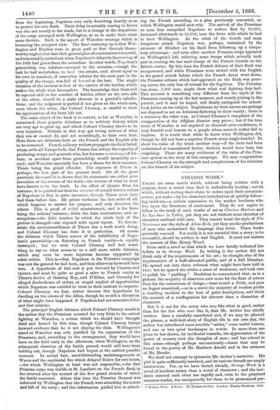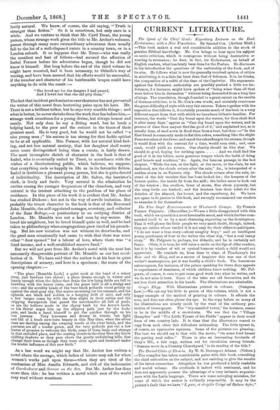STRANGE WORK.*
THERE are some novels which, without being written with a purpose, have a moral tone that is undoubtedly healthy ; novels which, without resting their claim to notice upon their sensation- scenes, yet make—by the abundant introduction of quickly-follow- ing incidents—a certain concession to the weaker brethren who live upon the literature of excitement. They do not aspire to follow in the track of such works of art as Clarissa liar/owe and Le Lys dans la Vallee, yet they are not without some sketches of character outlined with care. They cannot boast the style of The Newcomes nor the style of Adam Bede, yet they are the productions of men who understand the language they write. These books generally succeed. For really it is not essential that a story, to be successful, should be written in bad English. It need not imitate the manner of Mrs. Henry Wood.
Some such a novel as that which we have briefly indicated lies before us in Strange Work. In writing it the author did not think only of the requirements of his art ; he thought also of the requirements of a half-educated public, and of a dull librarian. He spread out into three volumes what might have been told in two ; but he spared the critics a sense of weariness, and took care to polish his "padding." Doubtless he remembered that, as in a picture, the majority of observers care more for the flash of colour than for the correctness of design,—buzz round a Frith, and pass au Ingres unnoticed,—so in a novel the majority of readers prefer a startling incident to the best of quiet descriptions, and think the account of a conflagration far cleverer than a dissection of character.
But it is not for the many who may like what is good, rather than for the few who must like it, that Mr. Archer has chiefly written. Into a carefully considered and, if we may be allowed the phrase, a well-knit story of English life in our own day, the author has introduced some sensible "asides," some useful lessons, and one or two quiet landscapes in words. In more than one place he has shown, by incidental remarks, his appreciation of the power of scenery over the thoughts of men ; and has echoed in this sense—though perhaps unconsciously—tones that may be found in the poetry of Mr. Matthew Arnold and in the sermons of Mr. Brooke.
We shall not attempt to epitomize Mr. Archer's narrative. His plot is quite sufficiently involved, and its various threads are amply interwoven. For, as we have hinted already, Strange Work is a novel of incident rather than a novel of character ; and the inci- dents succeed each other too rapidly and, even to the practised romance-reader, too unexpectedly for them to be pronounced per-
* Strange Work. A Novel. By Thomas Archer. London : Tinsley Brothers. 1563.
fectly natural. We know, of course, the old saying, "Truth is stranger than fiction." So it is sometimes, but only once in a while. And we venture to think that Mr. Cyril Trent, the young parson, whose strange work gives the title to Mr. Archer's volumes, passes through many more extraordinary adventures than usually fall to the lot of a well-disposed curate in a country town, or in a London suburb. It so happens that Mr. Trent—who was really the manliest and best of fellows—had secured the affection of Isabel Fermor before his adventures began, though he did not know it himself. But long before the end of the third volume he might have resorted, had it been necessary, to Othello's way of wooing, and have been assured that his efforts would be successful, if the number and character of his hairbreadth 'scapes could have anything to do with the result :—
" She loved me for the dangers I had passed, And I loved her that she did pity them."
The fact that incident predominates over character has not prevented the writer of this novel from bestowing pains upon his hero. Mr. Trent is not a brilliant talker, but he says very sensible things ; and what is better, he never shrinks from the work that lies before him,— strange work sometimes for a young divine, but always honest and manly. Not only does he say a fitting word, but he lends a helping hand, to the poor and the outcast in the times of their greatest need. He is very good, but he would not be called "a nice young man ;" his nature is too strong for that feeble epithet to be at all applicable. Mrs. Fermor, with her natural kind feel- ing, and not less natural anxiety, that her daughter shall marry some more distinguished being than a curate, is fairly drawn. The most incomplete sketch of character in the book is that of Isabel, who is eventually united to Trent, in accordance with the wishes of a discriminating public, which believes, we suppose, that everything ends as happily in life as in its favourite fiction.
Isabel is doubtless a pleasant young person, but she is quite devoid of individuality. The description of Mr. Salter, the barrister's clerk, is lively and facile. Very natural is the admiration he excites among the younger frequenters of the chambers, and very natural is the interest attaching to the problem of his place of residence. In this piece of his work it is evident that Mr. Archer has studied Dickens ; but not in the way of servile imitation. But probably the truest character in the book is that of the Reverend John Mumble, the self-appointed manager, secretary, and collector of the Zoar Refuge, —a penitentiary in an outlying district of London. Mr. Mumble was not a bad man by any means. He loved his neighbour, but he loved himself quite as well, and he had taken to philanthropy when congregations grew tired of his preach- ing. But his new vocation was not without its drawbacks, and the good man occasionally had cause to wish that there was some other "door opened" for a labour of love, where there was "a fixed income, and a well-established reserve fund."
But we will not part from Mr. Archer's novel with the neat but necessarily disagreeable portrait of Mr. Mumble as our last recol- lection of it. We have said that the author is at his best in quiet descriptions of scenery, and here is a specimen ; the scene of the opening chapters :—
" The place [Bramble Lock] a quiet nook at the bend of a minor river, just between two shires ; a place dreary enough in winter and lonely enough when the dykes that drain the low-lying fields are full to brawling with the heavy rains, and the grass land is all a sludge and ooze ; and the scrubby heads of the bare black pollards stand grimly up against the steel-grey sky, like mutes mourning for the summer, and the uplands are black and sodden in a hanging drift of mist, and only a few barges come by with the fires alight in their cabins and the dripping waterproofs that guard the merchandise all full of pools, as are the hollows made in the clayey bank by the horse's hoofs, as his driver urges him up the slippery path just by the lock- gate, and lends a hand himself to get the quicker through on his
wet journey. Very lonesome and dreary in winter, but light and full of a fresh new-born beauty in this May time, when the silver dace are darting among the swaying weeds at the river brink, and the pastures are all a tender green, and the very pollards put out a few leaves of promise to welcome the birds, some of them large and strange in that secluded place, and the soaring clouds in the clear blue sky throw shifting shadows as they pass above the gently undulating bills, that change their hues as though they were alive again and breathed under the tender influence of this new birth."
As a last word we might say that Mr. Archer has written a novel above the average, which ladies of leisure may ask for when women's works pall upon them—when they are tired of the mechanism of Miss Amelia Edwards, and sick of the indecencies of Gardenhurst and Sorrow on the Sea. But Mr. Archer has done more than this : he has written a novel which men of the world may read without weariness.



































 Previous page
Previous page